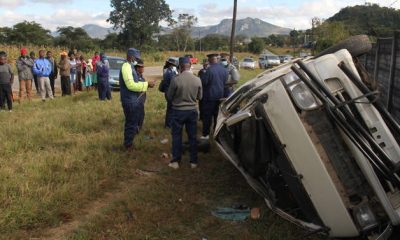Current Affairs
Minister Garwe Launches Anti-Corruption Taskforce for Local Authorities

In a decisive move to tackle deepening corruption within Zimbabwe’s local authorities, Minister of Local Government and Public Works, Daniel Garwe, has unveiled a Special Taskforce aimed at investigating and addressing graft cases across the country’s 92 local councils.
The initiative is being implemented in collaboration with the Zimbabwe Anti-Corruption Commission (ZACC) and the Zimbabwe Republic Police (ZRP), with the goal of expediting the investigation and resolution of long-standing corruption allegations.
Speaking at a press conference in Harare, Minister Garwe emphasized the urgency of confronting systemic corruption within councils, stating that the volume and complexity of existing cases warranted a coordinated, multi-agency approach.
“While the Ministry has routinely carried out internal audits and investigations, the scale of current corruption cases requires the involvement of ZACC and the police to ensure thorough and effective intervention,” he said.
Although ZACC and the police are constitutionally empowered to pursue criminal proceedings, the Ministry’s role centers on identifying governance failures and administrative irregularities. Garwe noted that any suspected criminal activity uncovered during ministry-led reviews is referred to the appropriate law enforcement agencies.
He cited provisions under the Urban Councils Act (Chapter 29:15) and Rural District Councils Act (Chapter 29:13), which authorize the Minister to appoint investigative teams to examine governance-related issues within local councils.
In response to ZACC’s recommendations, the Ministry has also created an Integrity Committee tasked with promoting ethical conduct and preventing corruption at the local government level.
“The Taskforce will operate as a joint investigative body with immediate effect,” Garwe said. “Its mandate includes clearing the backlog of unresolved cases and probing new allegations where red flags have been raised.”
He stressed that the Ministry’s involvement is not a replacement for law enforcement operations but rather a reinforcement to ensure a more robust and united approach to rooting out corruption.
“Local authorities are the frontline of public service delivery. When corruption thrives at that level, the consequences are felt directly by citizens. This Taskforce is about restoring integrity and public confidence in our local governance systems,” he added.
ZACC Chairperson Michael Reza echoed the Minister’s sentiments, affirming the Commission’s commitment to ensuring that perpetrators are held accountable.
“This partnership is a powerful tool in the fight against corruption. We will ensure that all guilty parties are brought to justice,” Reza said.
Also present at the launch were Deputy Minister Engineer B. Kabikira and ZACC Commissioner K. Paradza, who expressed their support for the initiative.
The establishment of the Taskforce marks a renewed effort by government to improve transparency, enforce accountability, and rebuild trust in local governance structures.
ALSO READ : Zanu PF Women’s League Boosts Economic Projects Through YW4ED Partnership
Current Affairs
Hon. Garwe Rallies Murehwa North: Unity, Agriculture and Presidential Gifts

15 000 party members to get mealie meal
Itai Mazire
Amid a vibrant atmosphere of community spirit, Mashonaland East Provincial Chairman and Member of Parliament for Murehwa North, Honourable Daniel Garwe, conducted an extensive interactive tour across the constituency this week.
Addressing large gatherings of enthusiastic party supporters, Hon. Garwe delivered a clear message: the time for political tensions has passed, and the season for national productivity has arrived.
The tour, which spanned several wards, focused on reinforcing the developmental goals of Vision 2030 and ensuring food security at household level. Hon. Garwe said the nation must remain insulated from divisive politics and instead consolidate its efforts under the leadership of President Emmerson Mnangagwa.

Rather than focusing on the ballot box, the legislator urged his constituents to turn their attention to the fields. He said that the backbone of the Zimbabwean economy remains agriculture and that the government is committed to supporting every farmer.
“The country is currently not in election mode. We must remain a united force against those trying to hinder the success of Vision 2030. Our primary focus right now must be on the land; we need to focus on agriculture to ensure our nation thrives,” he said.
To support this drive, he announced that the Presidential Inputs Scheme is moving into its next phase. He assured farmers that the critical top-dressing fertilisers required for the current cropping season would be arriving imminently.
“I want to assure every farmer in Murehwa North that the government hears you. Top-dressing fertilisers will be distributed starting next week across the entire constituency under the Presidential Inputs Scheme to ensure we maximise our yields,” said Hon. Garwe.
The tour took an emotional turn in Ward 8 and Ward 16 of the Tongogara District, where Hon. Garwe oversaw the distribution of mealie meal to 1 500 party members.
The exercise will see Hon. Garwe touring 10 party districts, with a total of 15 000 party members set to receive mealie meal.
The gesture was aimed at cushioning vulnerable households and ensuring that the spirit of the New Year reached every kitchen in the district.

Hon. Garwe was quick to point out that the aid was a direct token of appreciation and care from the Head of State.
“No one and no place will be left behind. This mealie meal we are distributing today to these 1 500 families is a New Year gift from President Mnangagwa to the people of this constituency as a sign of his continued love and support. We have toured three districts today,” he said.
Throughout the interactive sessions, Hon. Garwe called for vigilance and loyalty to the national vision. He encouraged the crowds of supporters to ignore external pressures and focus on the tangible development occurring within their own communities.
“We must stand together and protect the progress we have made. Let us not be swayed by those who wish to see us fail, but rather stay committed to the path of development and the leadership of President Mnangagwa,” he said.

The tour concluded with local leaders praising Hon. Garwe’s hands-on approach, noting that the combination of immediate food relief and the upcoming fertiliser distribution would provide much-needed stability for the constituency in the coming months.
Current Affairs
Government Cracks Down on Luxury Vehicles, Foreign Trips by Officials

The Government of Zimbabwe has announced strict new measures to curb spending by public officials, including an immediate clampdown on the purchase of luxury vehicles and non-essential foreign travel. The funds saved from these cuts will be redirected towards key sectors such as healthcare and education.
The move forms part of wider cost-cutting reforms being implemented under the National Development Strategy 2 (NDS2), aimed at improving financial discipline across government. Authorities say the measures are necessary to reduce pressure on the national budget and prioritise spending that delivers direct benefits to citizens.
Under the new policy framework, the acquisition of high-end vehicles for official use will be tightly controlled, while foreign trips by public servants will be subject to stricter approval processes to ensure they are justified and essential.
According to a government statement, the initiative falls under NDS2’s “Expenditure Rationalisation” pillar, which seeks to eliminate unnecessary and inefficient spending. Officials acknowledged that excessive vehicle procurement and frequent overseas travel have become costly practices that are no longer sustainable.
The government said that over the next five years it will enforce firm controls on non-essential expenditure, with savings channelled towards critical areas such as public health, education, infrastructure development, and social protection programmes.
Authorities emphasised that the reforms reflect a commitment to responsible financial management, ensuring public resources are used efficiently and in ways that support national development priorities and improve the lives of Zimbabweans.
Current Affairs
War on Drugs Intensifies in Murehwa North

-
Hon. Daniel Garwe launches whirlwind constituency tour in Murehwa North
-
War declared on drug peddlers and child marriages as sting operations begin
-
500 vulnerable households receive food aid during minister’s outreach program
Mashonaland East Provincial Chairman and Member of Parliament for Murehwa North, Honorable Daniel Garwe, has kicked off a high-octane whirlwind tour of his constituency, vowing to flush out drug dealers and protect the girl child from the scourge of early marriages.

The tour, which is set to cover 10 wards over the coming days, saw the legislator and Cabinet Minister for Local Government descend on Tongogara District today.
The visit was marked by a massive social-welfare intervention, where 500 vulnerable beneficiaries — including the elderly, widows, widowers, child-headed families, people living with disabilities, and village heads — received essential mealie-meal supplies to cushion them against food insecurity.
Addressing a capacity crowd, Hon. Garwe delivered a stern warning to those fueling social decay in the province, saying the era of impunity for those exploiting minors is over.
“The law will not blink when it comes to the protection of our children. I am warning every individual involved in the archaic and criminal practice of child marriages that your days of freedom are numbered. We will ensure you are brought to book without fear or favor,” said Hon. Garwe.
Turning his sights to the drug menace currently rocking Mashonaland East, the Provincial Chairman revealed that a security sting operation is already in motion.
He urged those struggling with addiction to seek help, while promising a tough stance against those selling drugs.
“To the drug and substance peddlers who are destroying the future of our youth, know this: a massive sting operation is already underway across the province, and we are coming for you because your predatory days are officially over.”
On the political front, Hon. Garwe called for “unity of purpose,” urging the community to move past petty divisions and focus on national development under the Second Republic.
He said that the developmental trajectory set by President Emmerson Mnangagwa is a non-negotiable path toward prosperity.
“We must remain united as a people because development has no political color. Let us rally behind the visionary leadership of the Father of our Nation, President Emmerson Mnangagwa, who is working tirelessly to transform our livelihoods,” said Hon. Garwe.
“Let there be no doubt in anyone’s mind that the journey toward Vision 2030 is unstoppable. Here in Murehwa North, we are the foot soldiers who will ensure that no place and no one is left behind in this great industrialization drive,” he added.
Hon. Garwe said that the government remains committed to the welfare of beneficiaries, stressing that the distribution of food is a right — not a privilege — for the marginalized.
“Our presence here today with these supplies is a clear demonstration that the Second Republic cares for its most vulnerable — the widows, the elderly, and persons with disabilities — and we will continue to provide this safety net as we march toward an upper-middle-income society,” said Hon. Garwe.
-

 Current Affairs2 months ago
Current Affairs2 months agoOperation restore order
-

 Crime and Courts3 months ago
Crime and Courts3 months agoMasasi High School Abuse Scandal Sparks Public Outcry
-

 Crime and Courts4 months ago
Crime and Courts4 months agoKuwadzana Man Jailed for Reckless Driving and Driving Without a Licence
-

 Current Affairs5 months ago
Current Affairs5 months agoBreaking: ZIMSEC June 2025 Exam Results Now Available Online
-

 Current Affairs4 months ago
Current Affairs4 months agoMunhumutapa Day: Zimbabwe’s Newest Public Holiday Set for Annual Observance
-

 Current Affairs3 months ago
Current Affairs3 months agoBREAKING NEWS: ZANU PF Director General Ezekiel Zabanyana Fired
-

 Current Affairs5 months ago
Current Affairs5 months agoNo Racism in Our Cricket: Government
-

 Current Affairs4 months ago
Current Affairs4 months agoGovernment Bans Tinted Car Windows in Nationwide Crime Crackdown















